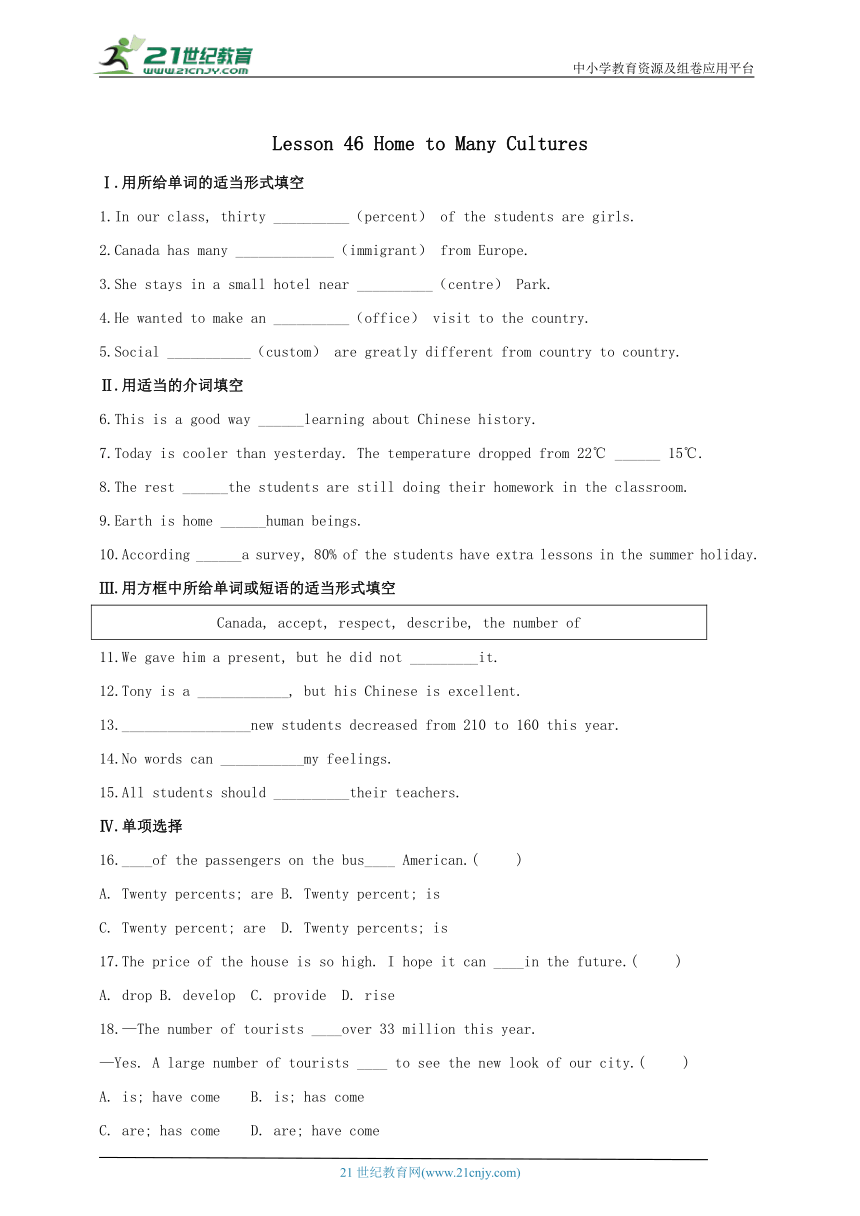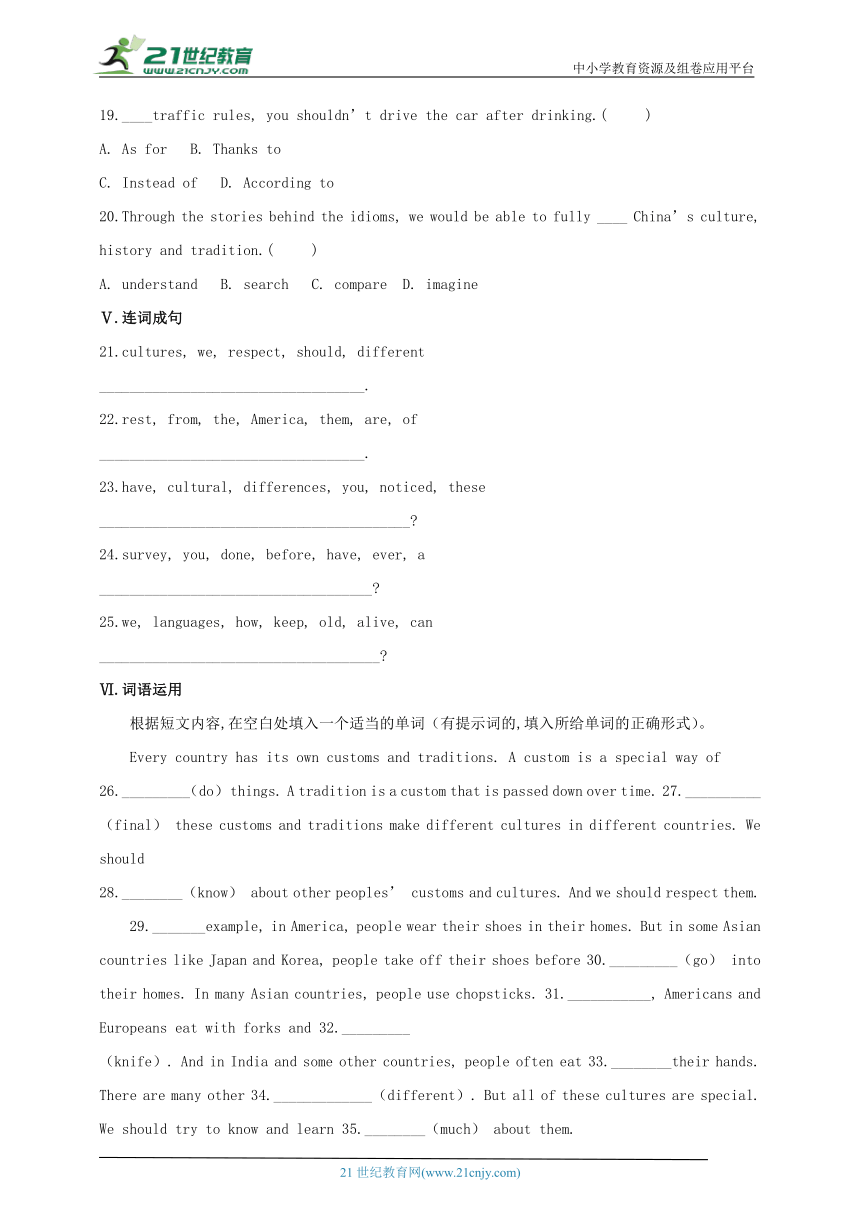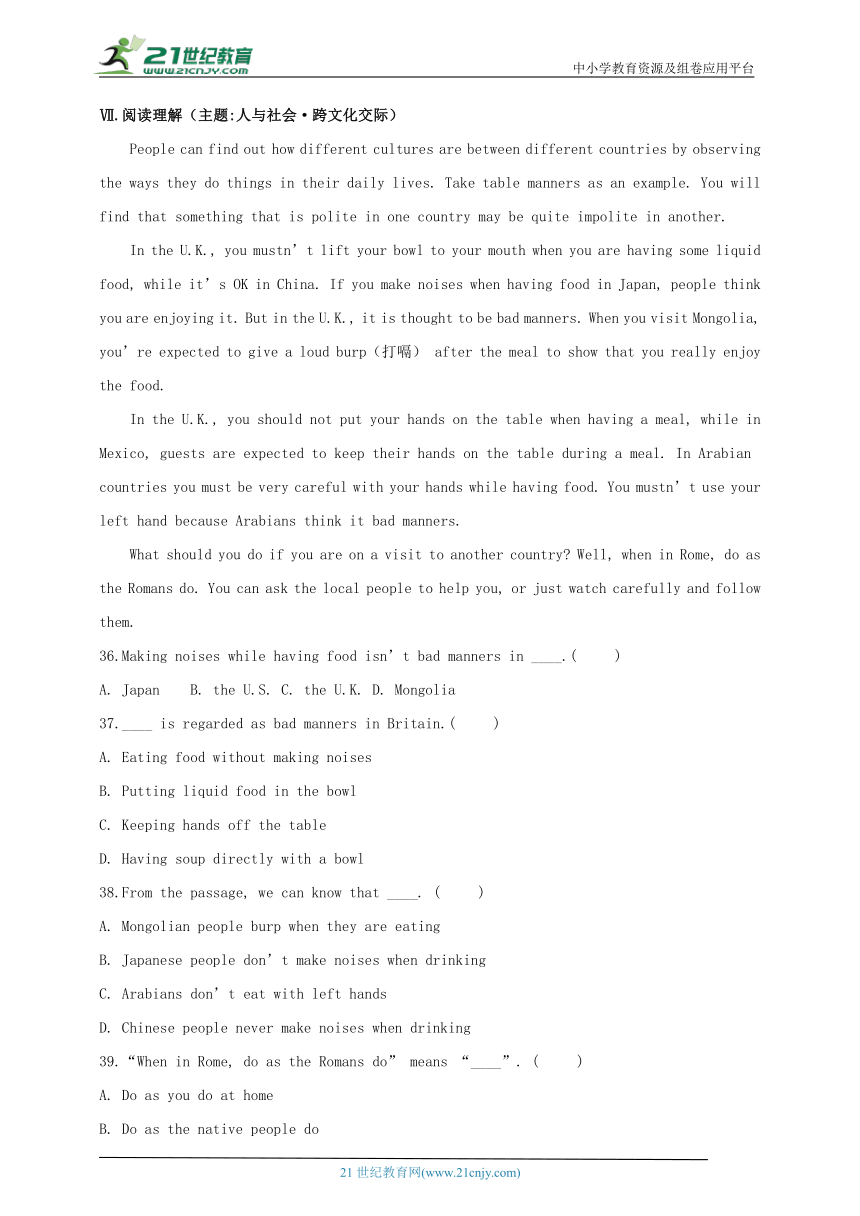冀教版英语九年级下册课时作业:Lesson 46 Home to Many Cultures(含答案)
文档属性
| 名称 | 冀教版英语九年级下册课时作业:Lesson 46 Home to Many Cultures(含答案) |  | |
| 格式 | docx | ||
| 文件大小 | 966.4KB | ||
| 资源类型 | 试卷 | ||
| 版本资源 | 冀教版 | ||
| 科目 | 英语 | ||
| 更新时间 | 2023-01-19 21:32:48 | ||
图片预览



文档简介
中小学教育资源及组卷应用平台
Lesson 46 Home to Many Cultures
Ⅰ.用所给单词的适当形式填空
1.In our class, thirty __________(percent) of the students are girls.
2.Canada has many _____________(immigrant) from Europe.
3.She stays in a small hotel near __________(centre) Park.
4.He wanted to make an __________(office) visit to the country.
5.Social ___________(custom) are greatly different from country to country.
Ⅱ.用适当的介词填空
6.This is a good way ______learning about Chinese history.
7.Today is cooler than yesterday. The temperature dropped from 22℃ ______ 15℃.
8.The rest ______the students are still doing their homework in the classroom.
9.Earth is home ______human beings.
10.According ______a survey, 80% of the students have extra lessons in the summer holiday.
Ⅲ.用方框中所给单词或短语的适当形式填空
Canada, accept, respect, describe, the number of
11.We gave him a present, but he did not _________it.
12.Tony is a ____________, but his Chinese is excellent.
13._________________new students decreased from 210 to 160 this year.
14.No words can ___________my feelings.
15.All students should __________their teachers.
Ⅳ.单项选择
16.____of the passengers on the bus____ American.( )
A. Twenty percents; are B. Twenty percent; is
C. Twenty percent; are D. Twenty percents; is
17.The price of the house is so high. I hope it can ____in the future.( )
A. drop B. develop C. provide D. rise
18.—The number of tourists ____over 33 million this year.
—Yes. A large number of tourists ____ to see the new look of our city.( )
A. is; have come B. is; has come
C. are; has come D. are; have come
19.____traffic rules, you shouldn’t drive the car after drinking.( )
A. As for B. Thanks to
C. Instead of D. According to
20.Through the stories behind the idioms, we would be able to fully ____ China’s culture, history and tradition.( )
A. understand B. search C. compare D. imagine
Ⅴ.连词成句
21.cultures, we, respect, should, different
___________________________________.
22.rest, from, the, America, them, are, of
___________________________________.
23.have, cultural, differences, you, noticed, these
_________________________________________
24.survey, you, done, before, have, ever, a
____________________________________
25.we, languages, how, keep, old, alive, can
_____________________________________
Ⅵ.词语运用
根据短文内容,在空白处填入一个适当的单词(有提示词的,填入所给单词的正确形式)。
Every country has its own customs and traditions. A custom is a special way of 26._________(do) things. A tradition is a custom that is passed down over time. 27.__________(final) these customs and traditions make different cultures in different countries. We should
28.________(know) about other peoples’ customs and cultures. And we should respect them.
29._______example, in America, people wear their shoes in their homes. But in some Asian countries like Japan and Korea, people take off their shoes before 30._________(go) into their homes. In many Asian countries, people use chopsticks. 31.___________, Americans and Europeans eat with forks and 32._________
(knife). And in India and some other countries, people often eat 33.________their hands. There are many other 34._____________(different). But all of these cultures are special. We should try to know and learn 35.________(much) about them.
Ⅶ.阅读理解(主题:人与社会·跨文化交际)
People can find out how different cultures are between different countries by observing the ways they do things in their daily lives. Take table manners as an example. You will find that something that is polite in one country may be quite impolite in another.
In the U.K., you mustn’t lift your bowl to your mouth when you are having some liquid food, while it’s OK in China. If you make noises when having food in Japan, people think you are enjoying it. But in the U.K., it is thought to be bad manners. When you visit Mongolia, you’re expected to give a loud burp(打嗝) after the meal to show that you really enjoy the food.
In the U.K., you should not put your hands on the table when having a meal, while in Mexico, guests are expected to keep their hands on the table during a meal. In Arabian countries you must be very careful with your hands while having food. You mustn’t use your left hand because Arabians think it bad manners.
What should you do if you are on a visit to another country Well, when in Rome, do as the Romans do. You can ask the local people to help you, or just watch carefully and follow them.
36.Making noises while having food isn’t bad manners in ____.( )
A. Japan B. the U.S. C. the U.K. D. Mongolia
37.____ is regarded as bad manners in Britain.( )
A. Eating food without making noises
B. Putting liquid food in the bowl
C. Keeping hands off the table
D. Having soup directly with a bowl
38.From the passage, we can know that ____. ( )
A. Mongolian people burp when they are eating
B. Japanese people don’t make noises when drinking
C. Arabians don’t eat with left hands
D. Chinese people never make noises when drinking
39.“When in Rome, do as the Romans do” means “____”. ( )
A. Do as you do at home
B. Do as the native people do
C. Ask the native people to do it
D. Watch how native people do it
40.The passage mainly tells us ____.( )
A. some different table manners
B. some table manners in Britain
C. different ways of having liquid food
D. ways on how to visit another country
答案
1.percent
2.immigrants
3.Central
4.official
5.customs
6.of
7.to
8.of
9.to
10.to
11.accept
12.Canadian
13.The number of
14.describe
15.respect
16.C
17.A
18.A
19.D
20.A
21.We should respect different cultures
22.The rest of them are from America
23.Have you noticed these cultural differences
24.Have you ever done a survey before
25.How can we keep old languages alive
26.doing
27.Finally
28.know
29.For
30.going
31.However
32.knives
33.with
34.differences
35.more
36.A
37.D
38.C
39.B
40.A
21世纪教育网 www.21cnjy.com 精品试卷·第 2 页 (共 2 页)
21世纪教育网(www.21cnjy.com)
Lesson 46 Home to Many Cultures
Ⅰ.用所给单词的适当形式填空
1.In our class, thirty __________(percent) of the students are girls.
2.Canada has many _____________(immigrant) from Europe.
3.She stays in a small hotel near __________(centre) Park.
4.He wanted to make an __________(office) visit to the country.
5.Social ___________(custom) are greatly different from country to country.
Ⅱ.用适当的介词填空
6.This is a good way ______learning about Chinese history.
7.Today is cooler than yesterday. The temperature dropped from 22℃ ______ 15℃.
8.The rest ______the students are still doing their homework in the classroom.
9.Earth is home ______human beings.
10.According ______a survey, 80% of the students have extra lessons in the summer holiday.
Ⅲ.用方框中所给单词或短语的适当形式填空
Canada, accept, respect, describe, the number of
11.We gave him a present, but he did not _________it.
12.Tony is a ____________, but his Chinese is excellent.
13._________________new students decreased from 210 to 160 this year.
14.No words can ___________my feelings.
15.All students should __________their teachers.
Ⅳ.单项选择
16.____of the passengers on the bus____ American.( )
A. Twenty percents; are B. Twenty percent; is
C. Twenty percent; are D. Twenty percents; is
17.The price of the house is so high. I hope it can ____in the future.( )
A. drop B. develop C. provide D. rise
18.—The number of tourists ____over 33 million this year.
—Yes. A large number of tourists ____ to see the new look of our city.( )
A. is; have come B. is; has come
C. are; has come D. are; have come
19.____traffic rules, you shouldn’t drive the car after drinking.( )
A. As for B. Thanks to
C. Instead of D. According to
20.Through the stories behind the idioms, we would be able to fully ____ China’s culture, history and tradition.( )
A. understand B. search C. compare D. imagine
Ⅴ.连词成句
21.cultures, we, respect, should, different
___________________________________.
22.rest, from, the, America, them, are, of
___________________________________.
23.have, cultural, differences, you, noticed, these
_________________________________________
24.survey, you, done, before, have, ever, a
____________________________________
25.we, languages, how, keep, old, alive, can
_____________________________________
Ⅵ.词语运用
根据短文内容,在空白处填入一个适当的单词(有提示词的,填入所给单词的正确形式)。
Every country has its own customs and traditions. A custom is a special way of 26._________(do) things. A tradition is a custom that is passed down over time. 27.__________(final) these customs and traditions make different cultures in different countries. We should
28.________(know) about other peoples’ customs and cultures. And we should respect them.
29._______example, in America, people wear their shoes in their homes. But in some Asian countries like Japan and Korea, people take off their shoes before 30._________(go) into their homes. In many Asian countries, people use chopsticks. 31.___________, Americans and Europeans eat with forks and 32._________
(knife). And in India and some other countries, people often eat 33.________their hands. There are many other 34._____________(different). But all of these cultures are special. We should try to know and learn 35.________(much) about them.
Ⅶ.阅读理解(主题:人与社会·跨文化交际)
People can find out how different cultures are between different countries by observing the ways they do things in their daily lives. Take table manners as an example. You will find that something that is polite in one country may be quite impolite in another.
In the U.K., you mustn’t lift your bowl to your mouth when you are having some liquid food, while it’s OK in China. If you make noises when having food in Japan, people think you are enjoying it. But in the U.K., it is thought to be bad manners. When you visit Mongolia, you’re expected to give a loud burp(打嗝) after the meal to show that you really enjoy the food.
In the U.K., you should not put your hands on the table when having a meal, while in Mexico, guests are expected to keep their hands on the table during a meal. In Arabian countries you must be very careful with your hands while having food. You mustn’t use your left hand because Arabians think it bad manners.
What should you do if you are on a visit to another country Well, when in Rome, do as the Romans do. You can ask the local people to help you, or just watch carefully and follow them.
36.Making noises while having food isn’t bad manners in ____.( )
A. Japan B. the U.S. C. the U.K. D. Mongolia
37.____ is regarded as bad manners in Britain.( )
A. Eating food without making noises
B. Putting liquid food in the bowl
C. Keeping hands off the table
D. Having soup directly with a bowl
38.From the passage, we can know that ____. ( )
A. Mongolian people burp when they are eating
B. Japanese people don’t make noises when drinking
C. Arabians don’t eat with left hands
D. Chinese people never make noises when drinking
39.“When in Rome, do as the Romans do” means “____”. ( )
A. Do as you do at home
B. Do as the native people do
C. Ask the native people to do it
D. Watch how native people do it
40.The passage mainly tells us ____.( )
A. some different table manners
B. some table manners in Britain
C. different ways of having liquid food
D. ways on how to visit another country
答案
1.percent
2.immigrants
3.Central
4.official
5.customs
6.of
7.to
8.of
9.to
10.to
11.accept
12.Canadian
13.The number of
14.describe
15.respect
16.C
17.A
18.A
19.D
20.A
21.We should respect different cultures
22.The rest of them are from America
23.Have you noticed these cultural differences
24.Have you ever done a survey before
25.How can we keep old languages alive
26.doing
27.Finally
28.know
29.For
30.going
31.However
32.knives
33.with
34.differences
35.more
36.A
37.D
38.C
39.B
40.A
21世纪教育网 www.21cnjy.com 精品试卷·第 2 页 (共 2 页)
21世纪教育网(www.21cnjy.com)
同课章节目录
- Unit 7 Work for Peace
- Lesson 37 Don't Fight!
- Lesson 38 Making School a Better Place
- Lesson 39 The Dove and the Olive Branch
- Lesson 40 The UN—Power of Words
- Lesson 41 Jenny's Good Advice
- Lesson 42 Peace at Last
- Unit Review
- Unit 8 Culture Shapes Us
- Lesson 43 A Visit to Chinatown
- Lesson 44 Popular Sayings
- Lesson 45 Different Manners
- Lesson 46 Home to Many Cultures
- Lesson 47 Good Manners
- Lesson 48 Supper with the Bradshaws
- Unit Review
- Unit 9 Communication
- Lesson 49 Get Along with Others
- Lesson 50 Tips for Good Communication
- Lesson 51 What Could Be Wrong?
- Lesson 52 The Power of a Smile
- Lesson 53 Working in Groups
- Lesson 54 How Embarrassing!
- Unit Review
- Unit 10 Get Ready for the Future
- Lesson 55 Look into the Future
- Lesson 56 Manage Your Time
- Lesson 57 Best Wishes
- Lesson 58 Ms.Liu's Speech
- Lesson 59 Keep Your Choices Open
- Lesson 60 Get a Good Education
- Unit Review
